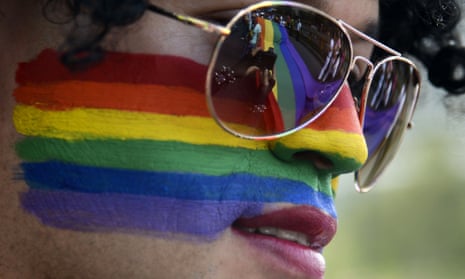When Nabeel Khalid joined the 26 million people around the world to superimpose a rainbow flag over his Facebook profile picture, he did not expect a tirade of abuse for showing support for same-sex marriage.
But the meme that swept the social networking site in the wake of last week’s decision by the US supreme court to legalise same-sex unions has not gone down well in Pakistan.
“The reaction was extremely negative with a lot of close friends, colleagues and ex-colleagues just completely unable to handle it,” said Khalid, an IT worker from Lahore. “They could not accept that someone who is married is supporting something they say is away from our culture and our religion.”
The online debate has seen supporters of marriage equality accused of abandoning Islam, as well as claims that bestiality will be next to be legalised, and the widespread circulation of Qur’anic verses condemning homosexuality.
Most observers say social intolerance has grown in Pakistan, a religiously conservative country that has seen radical groups working hard to spread a more militant version of the creed in recent decades.
Surveys find the country’s huge population of young people tends to be conservative: one poll found nearly 40% wanted the country to be run according to Sharia law.
But Marvi Sirmed, an outspoken social activist, says some people are becoming more liberal, particularly on the subject of gay rights.
“It is a very, very pleasant surprise for me that so many people on social media are actually supporting it, because that was certainly not the case just five years ago,” she said.
In 2011 Sirmed was the object of furious denunciations, after she appeared on a television show to defend the US embassy in Islamabad for hosting a “Pride celebration” for Pakistani lesbian, gay and transgender activists.
“It is still extremely difficult to even talk about these issues, but it is getting a little better,” she said.
The US supreme court decision has attracted little coverage in the mainstream media, but considerable scrutiny online.
“The generation growing up with the internet have more access to the outside world,” said Khalid, who lives in Lahore with his wife.
“My virtual life is mostly outside Pakistan, but on Facebook people inside the country can see what I am doing and they don’t necessarily understand.”
Only 32 million of Pakistan’s estimated 200 million people are thought to have access to the internet, although it is growing fast as smart phones become more popular.
Emrys Schoemaker, a researcher from the London School of Economics conducting field research on internet use in Pakistan, said a growing number of poorer people are using Facebook for the first time, as telecom companies offer free access to the site.
“A lot of people don’t know what the flag stands for,” he said. “One day labourer said he felt tricked after liking a friend’s rainbow profile picture and later discovering it was for gay marriage.”
On Wednesday, a call for the liberal-minded Express Tribune newspaper to be shut down was one of the most popular Twitter trends in Pakistan.
The source of the online anger was a blog on the newspaper’s website entitled “My husband is gay – A difficult truth”.
Hamza Ali Abbasi, a film star followed by more than 60,000 people on Facebook, declared himself “disappointed at people in Pakistan celebrating a behaviour that is taboo even in animals” and changed his profile picture to a rainbow flag with a red line across it.
“It’s strange how a law passed in a land far away has generated a debate about a topic which is somewhat irrelevant in Pakistan,” he later mused in a Facebook note.
“Now we know that intolerant fanatics exist who wear western clothes, have utmost exposure, education and are very eloquent in their English skills,” he wrote of the people who criticised his stance.
Homosexuality may be illegal in Pakistan, but can be highly visible at times. A large transgender community make their living on the streets by begging and prostitution.
In 2009, the supreme court ruled transgender people had the right to identify themselves as a third gender on their national identification cards and ordered the government to help find them work.
Mohsin Hamid, a Lahore-based author, said that while there was “a lot of homosexuality inside Pakistan, it is not an issue people talk about”.
“In Pakistan there is a kind of societal nervous laughter on the subject of homosexuality,” he said. “It evokes smiles and giggles, but there aren’t many public formats in which to have a serious conversation about it.”

Comments (…)
Sign in or create your Guardian account to join the discussion